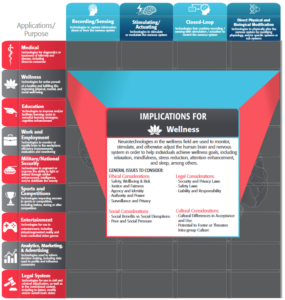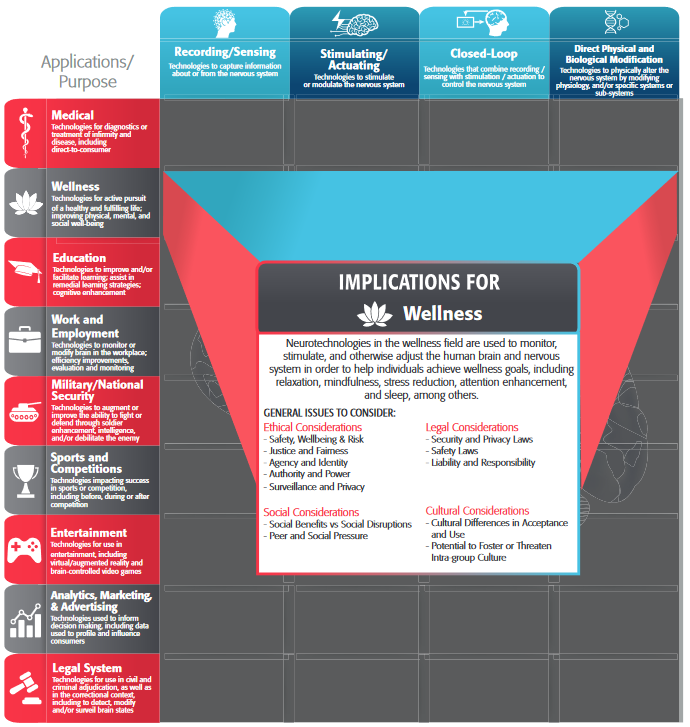Addressing the Ethical, Legal, Social, and Cultural Implications of Neurotechnology
As part of our effort to support the neuroengineering community, the IEEE Brain Neuroethics Subcommittee is developing a neuroethical framework for evaluating the ethical, legal, social, and cultural issues that may arise with the deployment of such neurotechnologies.
 The goals of this framework are to:
The goals of this framework are to:
- Describe the landscape of what we define as neurotechnologies
- Identify the ethical, legal, social, and cultural implications (ELSCI) that should be broadly considered during the research, development, clinical application, evaluation, adoption, and usage of neurotechnologies. While this framework is intended to provide particularly useful guidance for neurotechnology researchers and developers, the broad reach of ELSCI demands that all neurotech stakeholders—including device regulators, research ethics committees, scientific funding officers, clinicians, and end users—remain aware of these issues and engaged in related professional and public discourse.
IEEE Brain is in the process of developing documentation that supports this framework by providing examples of existing neurotechnologies and exploring the ethical, legal, social, and cultural issues (ELSCI) generated by a particular neurotechnology when used in specific contexts (medical, wellness, work and employment, legal, education, entertainment, marketing, sports and competition). Please see the General Introduction (link below) for more information on the overall effort. Links to information on each of the applications are also provided here.
The intent is for the framework documents to evolve as new developments, uses, and issues arise, and therefore we would appreciate receiving your feedback on current documentation. Please note that this site will also evolve as more detailed documentation is published in each of the applications over time. At this time, only the Medical Application is available for public review. Please use this FORM to provide your feedback to the IEEE Brain Neuroethics Committee.
If you are interested in volunteering in one of these Working Groups to help advance the work, please complete this FORM and we will contact you.
Medical
Technologies for diagnostics or treatment of infirmity and disease including direct-to-consumer
Rebecca Monteleone
Alberto Antonietti
Michael Young
Denis Lavaree
Jennifer French
Joanne Nash
Zach McKinney
Joana Soldado
Noeline Prins
Jacob Robinson
Joanne Nash
Seungmin Nam
Lucy Tournas
Tom Stieglitz
Marcus Kaiser
Vedat Ozciftci
Wellness
Technologies for active pursuit of a healthy and fulfilling life; improving physical, mental, and social well-being
Katherine Bassil
Jeremy Greenberg
Adriana Pliego
Tamami Fukushi
Peter B. Reiner
Phoebe Gilbert
Alex Hsain
John David Chibuk
Jacqueline Csonka-Peeren
Jie Yin
Legal
Technologies for use in civil and criminal adjudication, as well as in the correctional context, including to detect, modify and/or surveil brain states
Jack Judy
Nicole Martinez
Ashley Williams
Anita Jwa
Matias Aranguiz
Jordi Domingo
Gary Marchant
Jennifer Chandler
Ricardo Abuchaim
Masatoshi Kokomo
Military / National Security
Technologies to augment or improve the ability to fight or defend through soldier enhancement, intelligence, and/or debilitate the enemy
Seth Elkin Frankston
Diane DiEuliis
Tracy Laabs
Kimberly Thacker
Matias Aranguiz
Paul Beach
Carl Wrede
Gabriella Smith
Rachel Wurzman
Joshua Mueller
Inga Ulnicane
Courtnie Jean Paschall
Work & Employment
Technologies to monitor or modify brain in the workplace; efficiency improvements, evaluation and monitoring
Avinash Kumar Singh
Yunus Telliel
Adrian Carter
Lex Telischak
Rachel Wurzman
Max Wilson
Nikhil Gowda
Kelly Neville
Jack Judy
Education
Technologies to improve and/or facilitate learning; assist in remedial learning strategies; cognitive enhancement
John Shook
Genevieve Smith Nunes
Bruce Hecht
Josep Maria Balaguer
Deepak Mewada
Manuel Guerrero
Ankita Moss
Uri Hasson
Sports & Competitions
Sports and Competition Technologies impacting success in sports or competition, including before, during or after competition
Robert Martone
Javier Lopez Frias
Armani Porter
Brett Wingeier
Entertainment
Technologies use for entertainment, including virtual/augmented reality and brain-controlled video games
Jack Judy
Jeremey Greenberg
Garrett Flynn
Bruce Hecht
Jordi Domingo
Ben Neumeyer
Tamami Fukushi
Marketing
Technologies used to inform decision making, including data used to profile and influence consumers
Florian Richter
Adolfo Ramirez
Annabel Gillard
Mikihiro Kasahara
Glossary / Review Committee
Oversight of documentation for consistent use of key terms and creation of full glossary.
Alberto Antonietti
Adam Steiner
Arleen Salles
Mark Fedyk
Denis Larrivee











